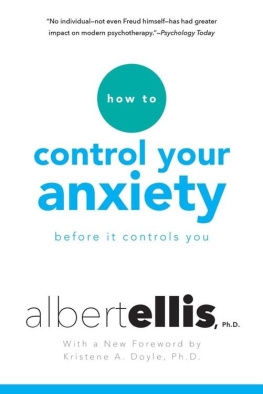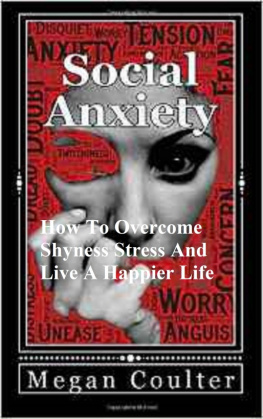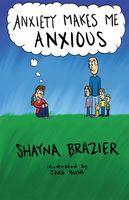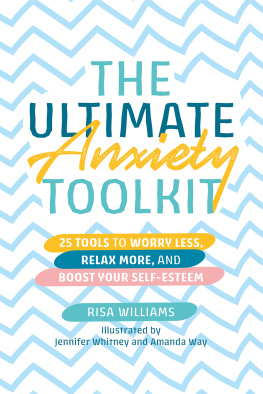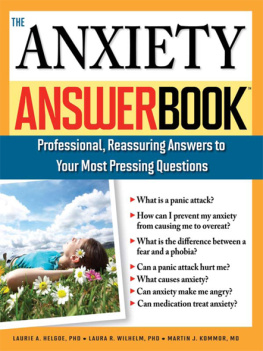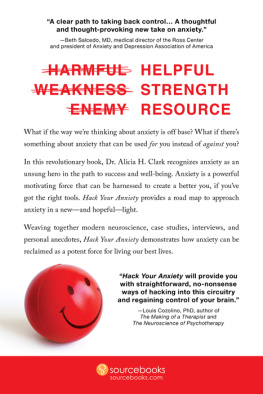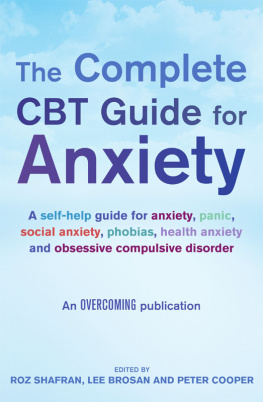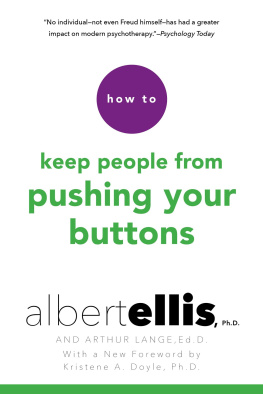A LSO BY D R . A LBERT E LLIS
How to Control Your Anxiety Before It Controls You
How to Stubbornly Refuse to Make Yourself Miserable About Anything (Yes, Anything)
How to Stop Destroying Your Relationships
How to Keep People From Pushing Your Buttons
Anger: How to Live With It and Without It
The Albert Ellis Reader
Reason and Emotion in Psychotherapy
Available from the Citadel Press/Kensington Publishing Corp.
How to Control Your
Anxiety
Before It Controls You
Albert Ellis, Ph.D.
and
Kristene A. Doyle, Ph.D., Sc.D.

CITADEL PRESS
Kensington Publishing Corp.
www.kensingtonbooks.com

All copyrighted material within is Attributor Protected.
For Janet L. Wolfe
A true helpmate for over three decades
Table of Contents
Foreword
If you are reading this book, the probability is high that you or someone you care about experiences anxiety. Anxiety is one of the most common difficulties people experience at some point in their lives. The good news is that in 1959, Dr. Albert Ellis developed Rational Emotive Behavior Therapy, the original Cognitive Behavior Therapy, which has been proven to be effective for problems with anxiety.
This book is in many ways a special tribute to Al himself. As he discusses in this book, as well as in most of the self-help materials he developed throughout the course of his life, Al, too, was afflicted with anxiety. He utilized the principles of behaviorism to overcome both his public speaking anxiety and his social anxiety, particularly as it related to women. All of Als books were written with passion and purpose; however, I believe this book in particular was close to Als heart because he himself experienced anxiety and found means to overcome it. What better testimony is there than that Albert Ellis himself conquered his own anxiety by applying the principles and strategies he outlines here?
One of Als main goals was to ensure that his clients and the general public learned the tools to become their own therapists. Reading this and his many other self-help books, including How to Control Your Anger Before It Controls You, How To Stubbornly Refuse to Make Yourself Miserable About Anything, Yes Anything! and How to Keep People from Pushing Your Buttons , will surely get you on your way to becoming your own therapist.
I had the honor of being a pre-doctoral intern at the Albert Ellis Institute and being mentored by Dr. Ellis. After my training, I stayed on at the Institute as a full-time employee, traveling the country with Al to conduct professional trainings and public lectures. He dedicated his life to helping individuals with their emotional and behavioral problems. He treated thousands of clients with anxiety difficulties, many of whom are presented as case examples in this book. Coleading therapy groups with Al, I observed him first-hand using the same strategies with his clients that he recommends in this bookand I watched his clients get better!
Al made a distinction between feeling better and getting better . Feeling better can be the result of telling your therapist, a friend, or a family member about your anxiety. Getting better results from using tools and strategies to overcome your anxiety and develop your conviction in a different way of looking at things.
If you or someone you care about suffers from anxiety, this book will be a guide through the theory of what contributes to the problem and a source of proven strategies to tackle it head on. The reader will find this book especially helpful because it provides cognitive, emotive, and behavioral strategies to control anxiety. It offers so many suggestions that you are bound to find several that will work for you. In addition, the tone in which this book is written allows the reader to find the humor in anxiety without minimizing how painful it can be at times.
On one of our road trips throughout the country, I was driving Al to our next venue and I asked him what he would like to have happen once he was no longer here. Without skipping a beat, he said he wanted the Albert Ellis Institute and REBT to continue. Having How to Control Your Anxiety Before It Controls You relaunched in a new print edition as well as an e-book is exactly what Al would have wanted. I believe he would be proud that his work continues to help the lives of individuals throughout the world.
Kristene A. Doyle, Ph.D., Sc.D.
Director of the Albert Ellis Institute
Acknowledgments
I would like to thank Jim Runyon, who did some beautiful word-processing for me. Jim Ellison suggested this book and worked with me on it from the start. Steve Palmer did a fine copyediting job. Ginamarie Zampano, the administrative director of the Albert Ellis Institute facilitated the gathering of material and the working out of innumerable administrative functions in her usual inimitable manner.
Why I Am Convinced That You Can Control Your Anxiety Before It Controls You
Until the age of nineteen, I was an extremely anxious individual. In fact, I think that I was probably born with a tendency toward making myself anxious. My mother was like that: She was a generally happy person but she also made herself quite anxious about little thingsmoney, for example. During my childhood and youth, she never really wanted for money. At one time, my father, who was a promoter and a great salesman, literally had a million dollarsand that was a great deal of money back in the 1920s. But she always worried about expenses, and whenever he left a fifty-dollar tip for a waiter, she would secretly take it back and substitute a much smaller tip. She saved her money in a separate account and had thousands of dollars in it. But she always worried about not having enough.
After my father lost his first million in the stock market, was on his way to making his second one, and the family really was doing well financially, my mother still worried about moneyand several other relatively unimportant thingsand kept saving and saving. She wasnt entirely wrong about this, for in 1929, my father lost his second million and couldnt pay her the regular alimony he was supposed to pay. But we got through the Great Depression all right because my brother, sister, and I started working and supporting the family. Still, my mother worried incessantlytill she died, with savings, at the age of ninety-three.
You could say that I probably learned how to worry from her, but that would hardly be accurate. My brother, who was nineteen months younger than I, also was raised in the same environment, and he was almost a pathological nonworrier. He took risks and did all kinds of dangerous things, and he never seemed to worry about the outcome. If these turned out all right, fine; and if they turned out badly, he was never thrown for a loop. He just went on to risk the next venture, whether it was social or business. In fact, he did very well for himselfjust because he rarely worried about anything.
Not so I! I was afraid of all kinds of unseen eventualities. I was a definitely shy, conforming, and hesitant child and adolescent, and I rarely took any great risksor, if I did take them, I worried about them. I especially had a great fear, and a real phobia, about public speaking. I was bright and talented enough and was often asked to make a little speech, be it in a class play or speaking out in class and giving answers to questions that the teacher felt sure I could answer. But, I voluntarily held myself in much of the time; and I particularly avoided public presentations.
Let me give you a typical example. I was a good speller, often the best in the class, but I avoided participating in spelling bees because I might make a mistake (which I practically never did) and thereby make a fool of myself. When forced by the teacher to participate, I would almost always outspell all the other kids and become the winner; but I was exceptionally anxious while doing so, and I didnt enjoy the spelling bees at all. I only enjoyed winning. Briefly.
Next page
